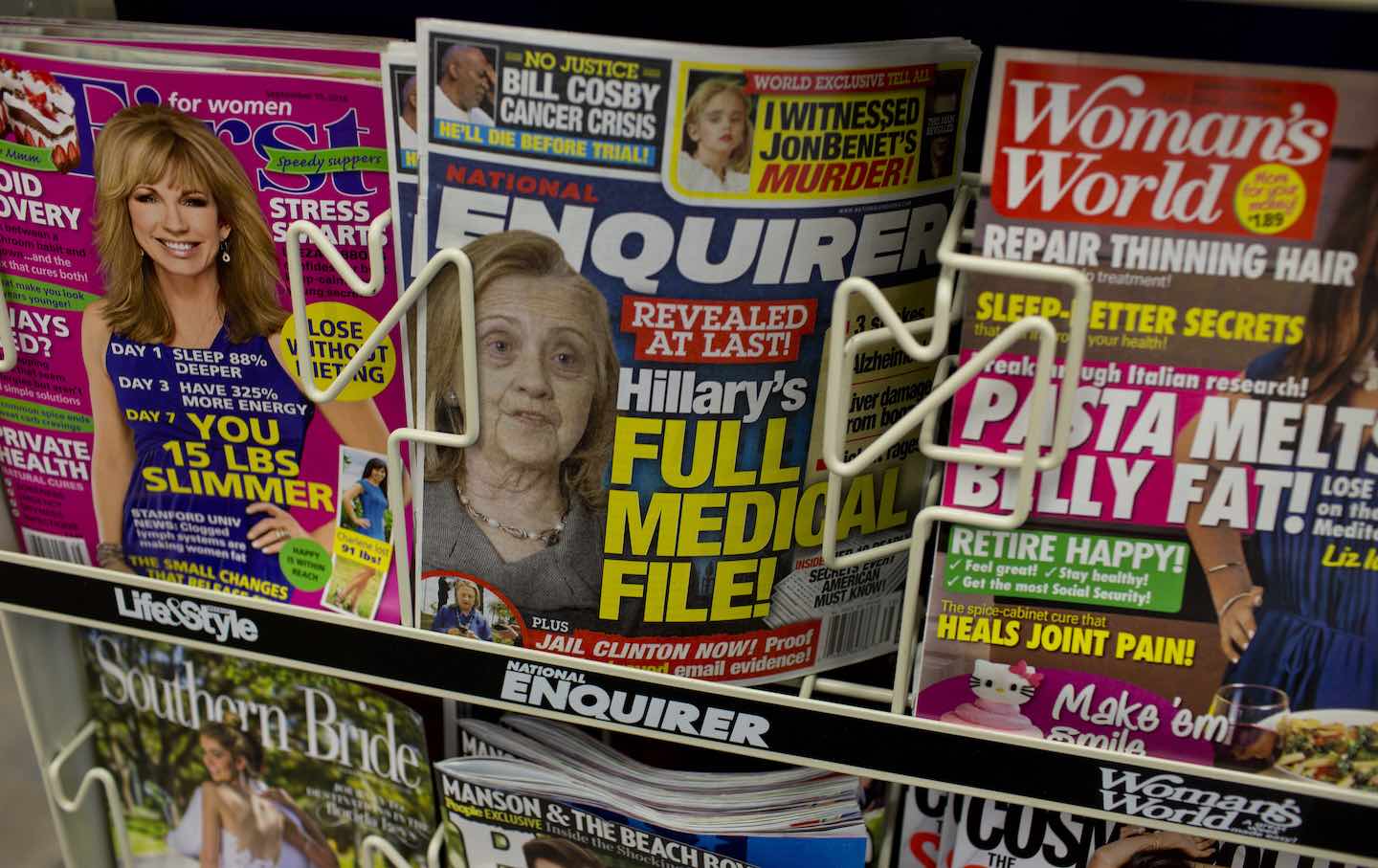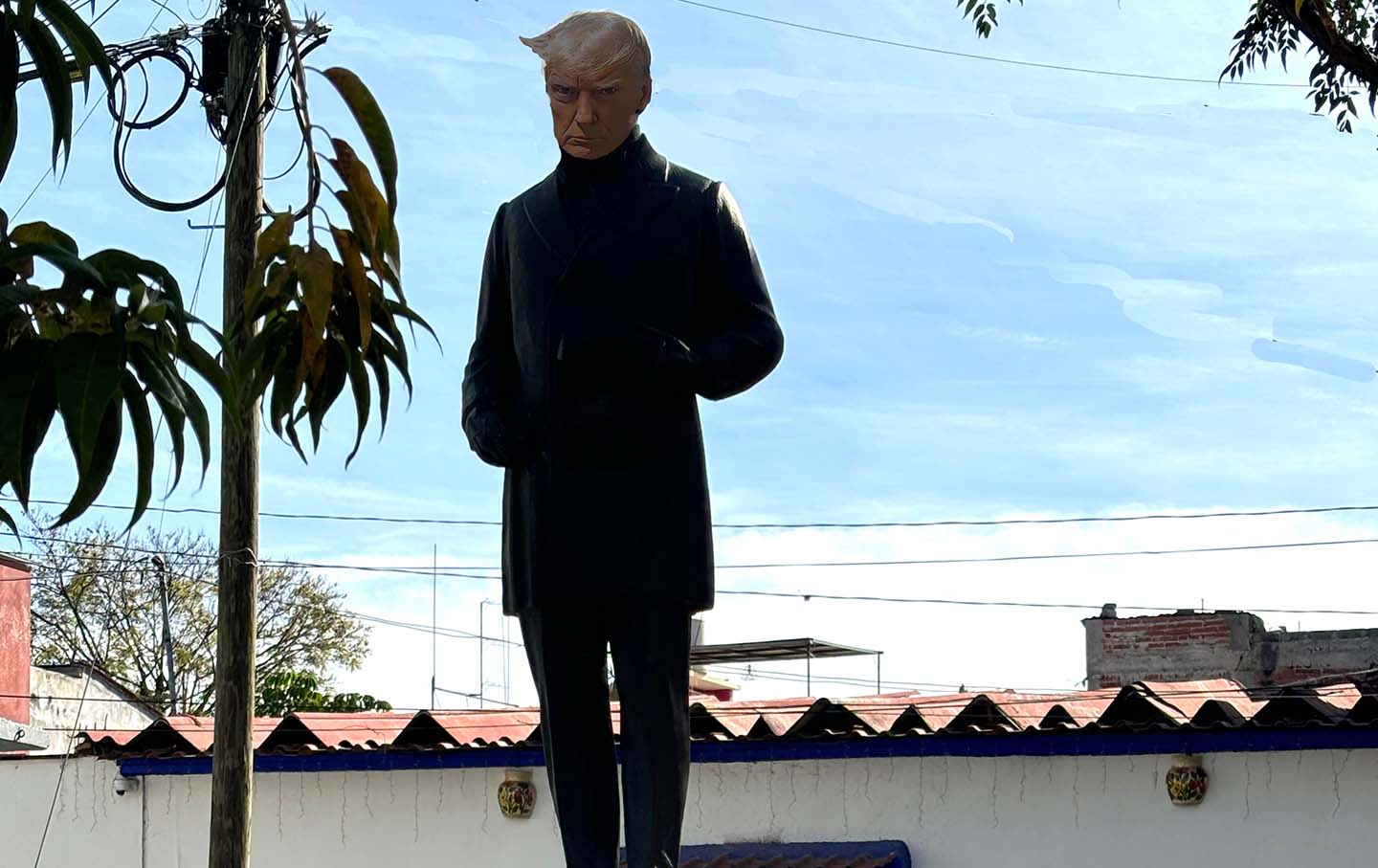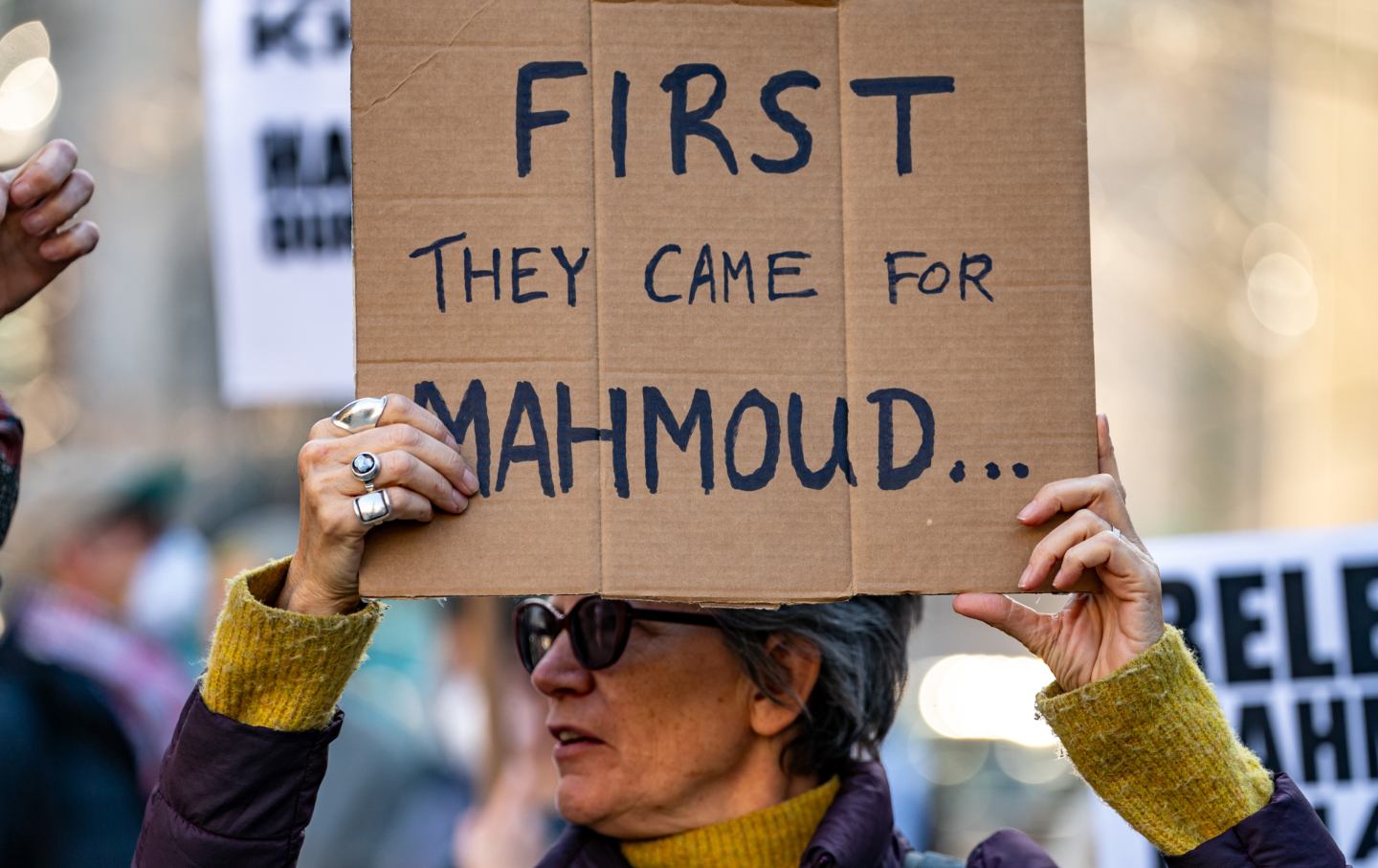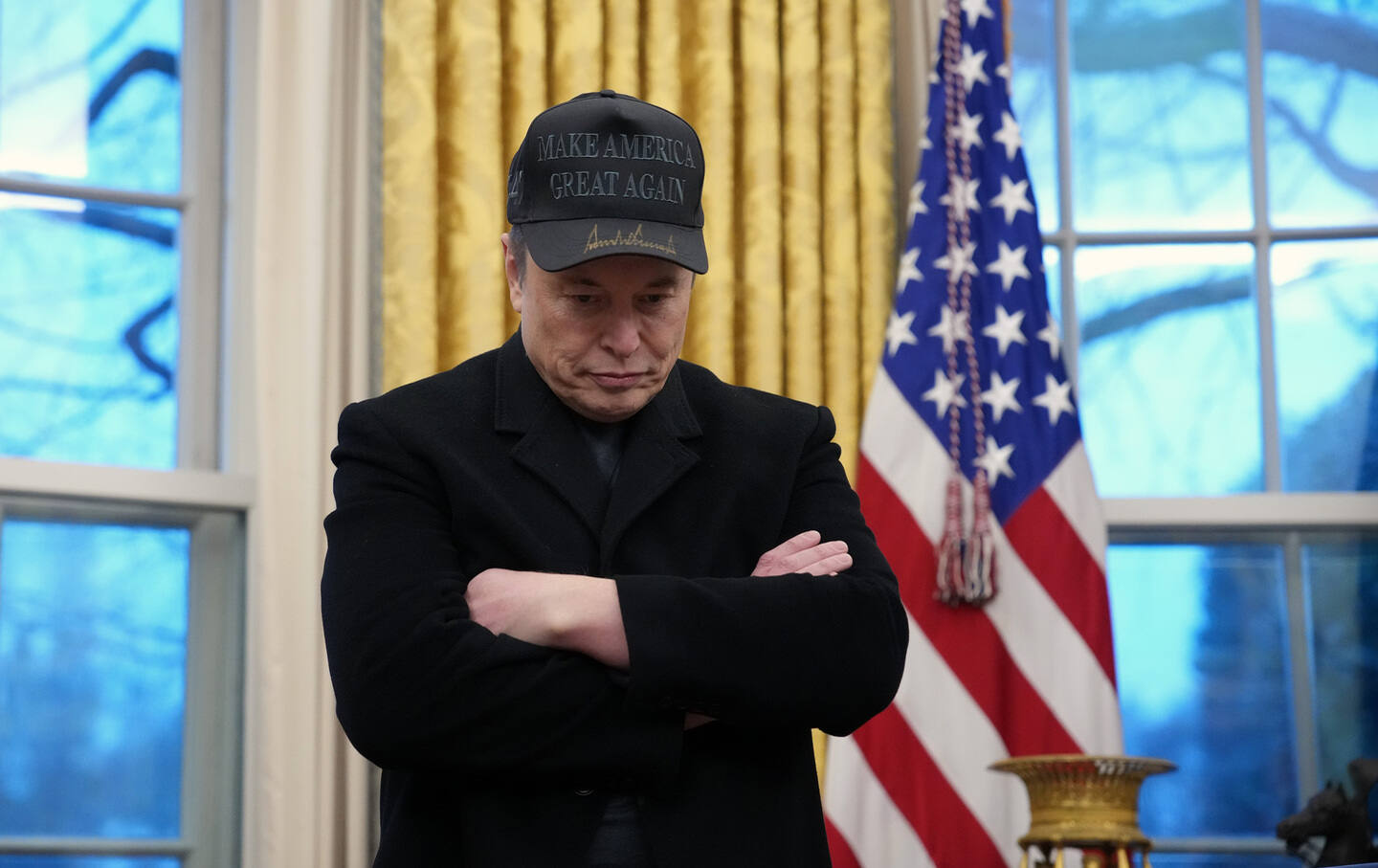Pecker Exposes Lengths Taken to Please Trump
Testimony by the former National Enquirer publisher detailed the Trump campaign’s involvement in directing the tabloid’s coverage of the 2016 election.

The National Enquirer in a Florence, South Carolina supermarket on September 14, 2016.
(Andrew Lichtenstein / Corbis via Getty Images)The sixth day of former president Donald Trump’s criminal trial pivoted around the testimony of Trump media crony David Pecker, the former publisher of National Enquirer. The day’s proceedings closely followed the theory of the case outlined in the prosecution’s opening statement: that early on in the 2016 presidential cycle, the Trump campaign established a clear MO for concealing and burying stories harmful to the candidate’s image. Relying on Pecker as a de facto surrogate of the campaign, Trump and his fixers licensed a journalistic killing spree, using the Enquirer’s coffers to squelch coverage not only of the Stormy Daniels liaison at the center of this trial but also reports of Trump’s alleged 10-month affair with former Playboy model Karen McDougal.
But Pecker’s testimony—which picks up again Thursday after presiding Judge Juan Merchan spends Wednesday tending to the other cases on his docket—did more than just establish the operational background for the $130,000 payoff allegedly paid to Trump’s erstwhile inamorata Daniels. Among other things, it showed the country’s most tirelessly self-advertised victim of alleged conspiratorial media coverage taking the lead role in orchestrating a thuggish propaganda campaign dedicated to burnishing the deeply counter-empirical case for his viability as the country’s best-qualified executive leader.
In recounting his decades-long professional dealings with the defendant, going back to his role in launching Trump Styles magazine in the 1980s, Pecker spoke admiringly of Trump’s hands-on ethos as a business leader—someone “knowledgeable, detail oriented…almost a micro-manager.” And indeed, when the Enquirer came across the McDougal story in 2016, per Pecker’s testimony, Trump stepped in personally to discuss the most effective means of disposing of it, short-circuiting the usual backchannel developed by his attorney-fixer Michael Cohen. (Another salacious Trump story, concerning an out-of-wedlock child the candidate was rumored to have fathered, didn’t have legs, but Pecker’s outfit paid out $30,000 to the tipster peddling it anyway, just to prevent other outlets from getting wind of it.)
Pecker explained that the arrangement with Cohen dated to the outset of the Trump campaign, just two months after the candidate’s 2015 ride down the Trump Tower escalator to throw his hat in the ring. He added without any prompting from the prosecution that he’d immediately offered to set up a “catch and kill” operation to shield the candidate from embarrassing disclosures about his personal life. “Mr. Trump was known as the most eligible bachelor,” Pecker said, without pausing to note that the candidate had, in fact, been married to his third wife, Melania, for a full decade at the time. The core arrangement here was quite simple, Pecker explained: “I would publish positive stories about Mr. Trump, and I would publish negative stories about his opponents.”
Indeed, he would. Working as what he called “the eyes and ears” of the Trump campaign, Pecker targeted the Democratic frontrunner with an ongoing series of Enquirer pieces about Bill Clinton’s wandering libido, as well as a litany of stories designed to embarrass Trump’s primary opponents. The headlines ranged from “Bungling Surgeon Ben Carson Left Sponge in Patient’s Brain!” to “‘Family Man’ Marco Rubio’s Love Child Stunner!” to “Ted Cruz Shamed by Porn Star.”The Texas senator was also the beneficiary of one of the Enquirer’s most storied works of tabloid fancy, with “Ted Cruz’s Father Caught with JFK Assassin.” Pecker testified he would share advance PDFs of these hit pieces with Cohen, who would offer additional pointers and commentary.
The Enquirer’s Trump coverage, meanwhile, was the sort of Great Leader hagiography that would have embarrassed the editors of Pravda in their mid-century apparatchik peak. An early installment, “Donald Trump: The Man Behind the Legend!” (byline: Donald Trump), set the tone for all the rest: “Bombshell Video: Donald Trump Was Right About 9/11 Celebrations”; “Cruzin’ to Victory! Ted Endorses Donald”; “Donald Dominates! Trump Edges Out Clinton in Latest Poll”—and of course the post-election gloat: “Sorry, Pollsters! Find Out How the National Enquirer Predicted President Trump.”
In the first order of court business the morning of Pecker’s testimony, the prosecutors had argued that Trump has already repeatedly and flagrantly violated the gag order imposed on him prior to the trial by Merchan. They enumerated at least 10 different violations of the order, involving everything from Trump’s Truth Social rants against Cohen to his reposting of right-wing media takedowns of Merchan’s daughter to Trump-doctored quotes from Fox News MAGA sycophant Jesse Waters in order to suggest liberals were in sinister cahoots to subvert the jury pool. Trump lawyer Todd Blanche feebly floated the claim that these were all “political” statements responding to various attacks from Trump’s ever-expanding enemies’ list, and hence protected speech, but provided no case law to back up the argument.
An exasperated Merchan didn’t rule immediately, but did inform Blanche that he flubbed the basic chronology in making his arguments—several of the Trump outbursts came before the statements that supposedly provoked them. Indeed, as Merchan archly observed, Blanche couldn’t supply a single example of a statement from a critic or rival that occasioned Trump’s tirades. “Mr. Blanche, you’re losing all credibility,” Merchan announced after the attorney insisted that Trump was indeed abiding by the terms of the gag order. “You’re losing all credibility with the court.”
In contrast to the defendant’s endless refrain of petulant whining, Pecker offered the more authentic account of how Trumpian media theory plays out in practice: Like all mob leaders, Trump only recognizes the authority of a rigged game. Any news outlet that didn’t ply some variation on “Donald Trump: The Man Behind the Legend!”—which was indeed the brunt of Trump press coverage throughout his private-sector career—would be showered with vituperation at Trump rallies, subjected to campaign freeze-outs, and marked out for vengeance on social media. The mafia model of social power drives everything having to do with Trump’s business and political career—as we were recently reminded when the presumptive 2024 GOP nominee for president announced that he’d be assessing a 5 percent fee on any down-ballot Republican campaign using his image and brand in their fundraising appeals—precisely how mob bosses generate revenue from bullied business owners.
The $130,000 Daniels payoff at the center of the New York criminal trial is the same sort of beak-wetting arrangement, albeit with the Trump operation in the payer’s role. Yet, for all the pundit laments that highlight the seaminess of the case brought against Trump while downplaying its significance, the deep-seated corruption laid out by Pecker establishes a crucial through line in all of Trump’s prosecutions and ongoing shakedown efforts. At every turn, Trump seeks to secure perfect impunity through any and all available illicit means—and the moment that anyone privy to these deals turns on him, they are, like Michael Cohen, instantly cast into the outer darkness, designated like the press as the Enemy of the People. It’s how his great political mentor Roy Cohn taught him to move through the world, and it’s why Trump will never abide by gag orders, business disclosure laws, or the obstacles thrown in his path by the courts and the press.
The same model of influence-peddling by de facto mugging clearly impelled the actions in Trump’s other pending prosecutions: for hoarding classified documents at Mar-a-Lago, for seeking to commit actual election interference in Georgia, and for fomenting a coup to reverse the results of a free and fair election and install himself as president. That’s why the ultimate indictment in Manhattan concerns not Trump, but the guardians of our political system and public discourse. They engineered the rotten system that the Donald Trumps and David Peckers of the world so gleefully exploit.
Support independent journalism that exposes oligarchs and profiteers
Donald Trump’s cruel and chaotic second term is just getting started. In his first month back in office, Trump and his lackey Elon Musk (or is it the other way around?) have proven that nothing is safe from sacrifice at the altar of unchecked power and riches.
Only robust independent journalism can cut through the noise and offer clear-eyed reporting and analysis based on principle and conscience. That’s what The Nation has done for 160 years and that’s what we’re doing now.
Our independent journalism doesn’t allow injustice to go unnoticed or unchallenged—nor will we abandon hope for a better world. Our writers, editors, and fact-checkers are working relentlessly to keep you informed and empowered when so much of the media fails to do so out of credulity, fear, or fealty.
The Nation has seen unprecedented times before. We draw strength and guidance from our history of principled progressive journalism in times of crisis, and we are committed to continuing this legacy today.
We’re aiming to raise $25,000 during our Spring Fundraising Campaign to ensure that we have the resources to expose the oligarchs and profiteers attempting to loot our republic. Stand for bold independent journalism and donate to support The Nation today.
Onward,
Katrina vanden Heuvel
Editorial Director and Publisher, The Nation








